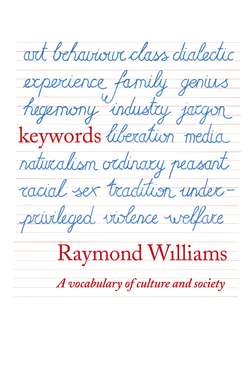Читать книгу Keywords: A Vocabulary of Culture and Society - Raymond Williams - Страница 36
COUNTRY
ОглавлениеCountry has two different meanings in modern English: broadly, a native land and the rural or agricultural parts of it.
The word is historically very curious, since it derives from the feminine adjective contrata, mL, rw contra, L – against, in the phrase contrata terra meaning land ‘lying opposite, over against or facing’. In its earliest separate meaning it was a tract of land spread out before an observer. (Cf. the later use of landskip, C16, landscape, C18; in oE landscipe was a region or tract of land; the word was later adopted from Dutch landschap as a term in painting.) Contrata passed into English through oF cuntrée and contrée. It had the sense of native land from C13 and of the distinctly rural areas from eC16. Tyndale (1526) translated part of Mark 5:14 as ‘tolde it in the cyte, and in the countre’.
The widespread specialized use of country as opposed to city began in lC16 with increasing urbanization and especially the growth of the capital, London. It was then that country people and the country house were distinguished. On the other hand countryfied and country bumpkin were C17 metropolitan slang. Countryside, originally a Scottish term to indicate a specific locality, became in C19 a general term to describe not only the rural areas but the whole rural life and economy.
In its general use, for native land, country has more positive associations than either nation or state: cf. ‘doing something for the country’ with ‘doing something for the nation’ or ‘… state’. Country habitually includes the people who live in it, while nation is more abstract and state carries a sense of the structure of power. Indeed country can substitute for people, in political contexts: cf. ‘the country demands’. This is subject to variations of perspective: cf. the English lady who said in 1945: ‘they have elected a socialist government and the country will not stand for it’. In some uses country is regularly distinguished from government: cf. ‘going to the country’ – calling an election. There is also a specialized metropolitan use, as in the postal service, in which all areas outside the capital city are ‘country’.
Countryman carries both political and rural senses, but the latter is stronger and the former is usually extended to fellow-countryman.
See CITY, DIALECT, NATIVE, PEASANT, REGIONAL
